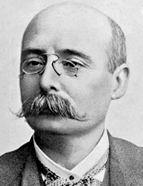

Born into a wealthy family, Zófimo Consiglieri Pedroso was the son of Zófimo Pedroso Gomes da Silva and his Genovese wife, of whom he received the surname Consiglieri. His father was a doctor in the Royal Railway Company. He became head of the service in 1904. He carved out a political career linked to the Progressive Party. Between 1879 and 1882 he was a member of parliament, representing Lisbon. In 1874, 1879 and 1891 he was a councillor in the Lisbon City Council. He became the president between 1896-1899. Consiglieri Pedroso completed his secondary education at the Liceu Nacional. At the age of 17, on 27 October 1868, he entered the College of Humanities. He graduated from the university on 11 July 1870. He began his professional career on 29 March 1875: he was appointed secretary of the Lisbon City Council's education division at the proposal of Elias Garcia. He defended his thesis — entitled A Constituição da Família Primitiva [The Formation of the Early Family] — at the College of Humanities [Curso Superior de Letras] on 16 January 1879, during the competition to fill the teaching vacancy of Universal and Homeland History, which he won. The 1885-1886 programme promised a chronological study from "oriental antiquity" to the second half of the 19th century, with an emphasis on European history. He became secretary of the board of professors on 24 October 1882 and headmaster in December 1901. He taught the subject of Universal Philosophical History between 1895 and 1896. Between 1902 and 1904, after the restructuring of the College of Humanities in 1901, he taught Ancient, Middle Ages and Modern History. He taught History of the Homeland from 1902 until his death.
In 1881, at the age of 30, he published Compêndio de História Universal [Compendium of Universal History] with a positivist orientation. Three years later, he published an extended version: Manual de História Universal. The scientific character of the evolutionist text was based on the historical affiliation of events, the parallel use of a synchronic and chronological vision and the search for laws that would govern history. The textbook was a chronological study, since prehistory, of the civilisations that influenced the formation of European nations in the 1800s and European history up to the author's time. The Compêndio was adopted in secondary education in the 1882-1883 biennium with the disagreement of António José Viale: it was seen as an attack on Christian dogma. It was used in the College of Humanities, where it reached its 5th edition (1896). In 1884, Teixeira Bastos pointed out its inaccuracies: history should predict the evolution of societies instead of studying the relationships between facts and underlying laws.
This work is financed by national funds through FCT - Foundation for Science and Technology, I.P, in the scope of the projects UIDB/04311/2020 and UIDP/04311/2020.
